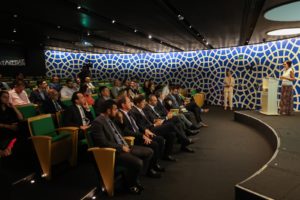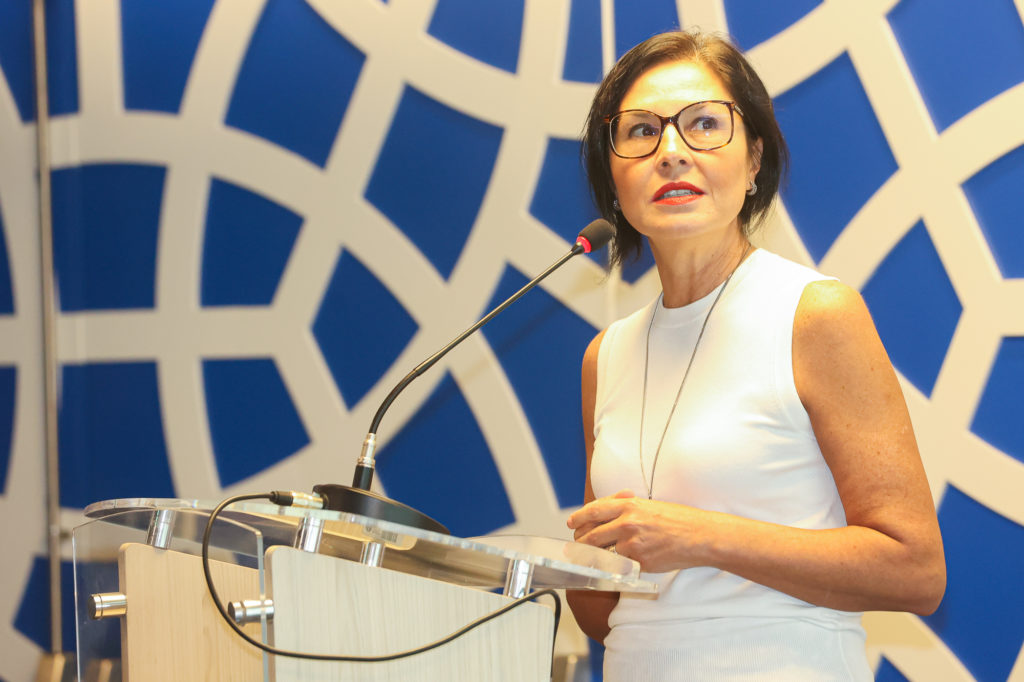São Paulo – The evolution of the halal market and the digital transformation of trade with the Arab countries will be at the heart of the activities of the Arab Brazilian Chamber of Commerce (ABCC) in 2023. The institution presented its calendar this Thursday (9) in a hybrid event at the company’s headquarters in São Paulo, aimed at Brazilian and Arab companies. In addition to the schedule, the meeting also showed the steps the ABCC is taking towards the digital universe, with the advancements of its Ellos platform, built to digitalize Brazil’s trade processes with the Arab countries (read more).
“One of our biggest highlights in terms of activities is the start of the Halal do Brasil project actions,” said the Marketing & Content director of the ABCC, Silvana Gomes (pictured above). Halal do Brasil is a partnership between the ABCC and the Brazilian Trade and Investment Promotion Agency (ApexBrasil), which aims to bring 500 Brazilian companies to the international halal market in 30 months, with investments of BRL 15.4 million (about USD 2.96 million). The goal is to diversify the current trade basket, increasing the supply of processed foods to countries with significant consumption of products following Islamic regulations.

Innovations in the halal market will be among the purposes of the ABCC’s participation at Gulfood, a food and beverage sector show to take place from February 20 to 24 in Dubai, in the United Arab Emirates, and to which the institution will take 11 exhibiting companies. The ABCC will hold a workshop on February 21 morning to lecture Brazilian companies about halal certification and host a networking cocktail on February 23 between Brazilian businesspeople and halal importers, both in Dubai. The ABCC will have two spaces at Gulfood, one in Hall 2 for food & beverages in general and one in the protein pavilion.
For Halal do Brasil, 14 activities are scheduled for 2023, such as participation in shows, missions, and initiatives to raise awareness about the project and training on halal certification. Brazilian companies will be taken to the shows Mihas, in September in Malaysia; Anuga, in October in Germany; Sial, in November in Indonesia; Saudi Halal, in November in Saudi Arabia; and Food Africa, in December in Egypt. The entity will also organize a mission to South Africa in June.
Activities in different regions of the world are on the calendar as the aim of Halal do Brasil is not just in Arab countries. According to data cited by Silvana Gomes in her presentation, in Malaysia, almost 70% of the population is Muslim; in Indonesia, 90%; and in South Africa, though only 6% of residents are Muslim, about 40% of the inhabitants consume halal products. Egypt, an Arab country in Noth Africa, has a free trade agreement with Mercosur, which encourages business, and Saudi Arabia plays an essential role in food security for the region.

“It is worth highlighting in all the shows we will participate in, we will take more companies to a market immersion program, promote parallel trade missions, where companies will be able to understand the market, have a look at retail, and meet the main regulatory players,” explained Silvana. With halal training, companies will learn about the markets and requirements for obtaining halal certification. “Companies will also have support for plant qualification,” said the Marketing & Content director.
Centered on halal, the ABCC will hold the Global Halal Brazil forum in October this year, in partnership with certifier Fambras Halal, in São Paulo. In addition to halal lectures and discussions, the event will have B2Bs and other activities supported by the Halal do Brasil project to make the second edition bigger than the first, held in 2021. On the occasion, the 20th anniversary of the Brazil-Arab News Agency (ANBA) will be celebrated with a press trip for Arab journalists to learn about Brazil’s productive potential.
Startups, supermarkets, sports
In this month of February, the ABCC will organize a Brazilian startup mission to the Arab world through its innovation hub, ABCC Lab. Companies will have activities in the UAE and Qatar from February 26 to March 3, and registration is still open for startups interested in participating. In May, the ABCC will promote the participation of over 20 Arab companies in the world’s biggest supermarket show, APAS Show. “We’ve had a significant number of Arab companies seeking to enter the Brazilian market,” said Silvana. According to the executive, there are still a few spots for companies to participate.
In addition to these activities, the ABCC will carry out many others within its committees, such as Wahi – Women Who Inspire, aimed at bringing Brazilian and Arab businesswomen closer together; Casa Arabe, which promotes Arab culture in Brazil; Ryadah, a think tank for opportunities in the sports segment between; the Legal Committee, which aims to produce content and support companies in matters related to legal affairs in Brazil-Arab trade; and Tourism, which aims to increase the flow of visitors and investments in the sector between the regions.
For more information:
Arab Brazilian Chamber of Commerce
+55 (11) 3145 3200
comercial@ccab.org.br
Translated by Elúsio Brasileiro




